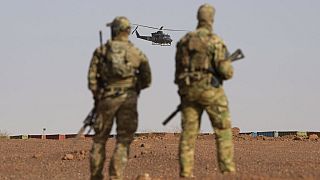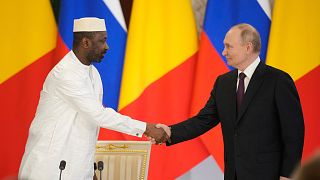Mali
French troops were on Monday handing back a military base in northeastern Mali ahead of a final withdrawal from the Sahel nation, France's army said, after nine years of fighting a jihadist insurgency.
The UN emissary there warned that the French withdrawal could leave Menaka, where they were based, vulnerable to jihadist attack.
The departure from the base "was conducted in good order, safely and in transparent fashion", said French army spokesman General Pascal Ianni in Paris.
It comes ahead of the last withdrawal from Mali "at the end of the summer" when France's main military base at Gao will be returned to Malian forces ending the Barkhane military operation, he added.
But El-Ghassim Wane, the UN Secretary General's special representative in Mali, warned that the pull-out could spell trouble for Menaka.
He said he had visited the town recently, and people there "did not rule out an attack on Menaka town", where 5,000 people forced to flee the violence had taken shelter.
"Should this scenario come to pass, the MINUSMA base is likely to be perceived as the last haven for civilians fleeing violence," Wane added, referring to the base of the UN peacekeeping force in Mali.
But he warned: "With minimal Malian forces in the area and some 600 peacekeepers available to protect civilians, UN personnel and assets, MINUSMA's ability to mount an effective response is limited."
At the UN Security Council, France offered to continue air support for the UN force from outside Mali.
"This support is necessary for MINUSMA and to protect the peacekeepers," French ambassador Nicolas de Riviere said in New York.
However, Bamako rejected the offer with Foreign Minister Abdoulaye Diop telling AFP: "Mali strongly opposes any air support that Barkhane might make to the (UN) mission on Malian territory".
Former colonial ruler France set up the Menaka outpost in 2018 in the wild tri-border zone where Mali meets Niger and Burkina Faso. It housed French and European special forces under the name Takuba tasked with training up local troops.
General Ianni told journalists the Takuba operation would not be transferred to neighbouring Niger.
France launched anti-jihadist operations in the Sahel in 2013, helping Mali snuff out a revolt in the north.
But the jihadists regrouped to attack the volatile centre of Mali, initiating a fiery insurgency that elected president Ibrahim Bubacar Keita was unable to crush.
In August 2020, protests against Keita culminated in a coup by disgruntled colonels -- followed by a second military takeover in May 2021.
From then on, relations with France have gone steadily downhill, propelled by the junta's resistance to setting an early date to restore civilian rule and Bamako's charges that France was inciting the region to take a hard line against it.
The bust-up accelerated last year, as the junta wove closer ties with Moscow, bringing in "military instructors" that France and its allies condemned as mercenaries hired from the pro-Kremlin Wagner group.
The French operation across the Sahel counted at its peak in 2020 some 5,500 troops before Paris started to reduce the numbers gradually and close the most forward bases at Kidal, Tessalit and Timbuktu in northern Mali.
Last January, France's ambassador to Bamako was expelled and the following month President Emmanuel Macron announced the total withdrawal from Mali as relations and security deteriorated.
However, the army said Monday that French forces were not quitting the Sahel region.
"The commitment to the struggle against terrorism, alongside the states of the region, at their request, remains an absolute priority," the spokesman said.











02:22
Cameroonian marine conservationists trained as scientific divers
01:02
Madgascar's President in Paris to discuss disputed Indian Ocean islets
01:41
UN warns of looming famine in Sudan, Gaza and 3 other global hunger hotspots
01:00
Interact with art in 'Euphoria: Art is in the Air' at Grand Palais
01:05
South Africa's ex-president loses bid to have arms deal graft charges dropped
Go to video
Mali: Army foils attack in Timbuktu, a day after jihadist assault killed 30 soldiers